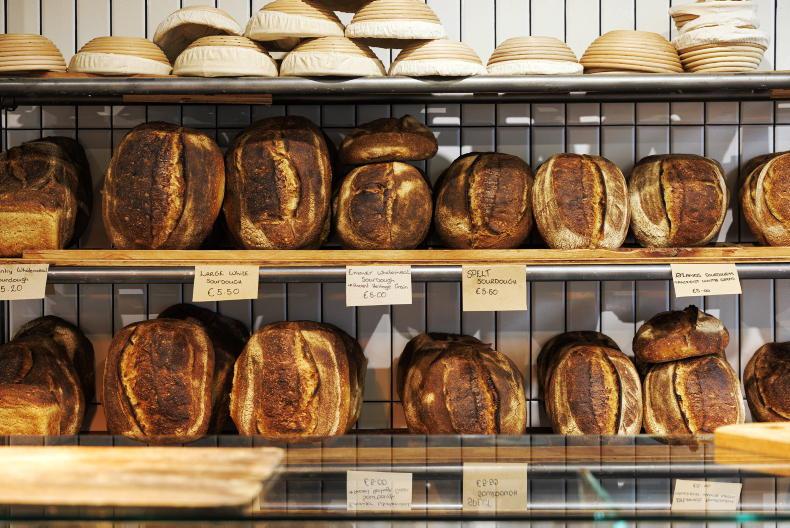Experimenting with sourdough bread wasn’t just a COVID-19-induced fad – Irish consumers are increasingly aware of the nutritional and health benefits around fermented foods. When it comes to bread, it’s hard to beat a slow-fermented sourdough for flavour and nutrition.
Unlike other breads, which use leavening agents like baking soda or yeast, sourdough is naturally fermented using a starter. This is a simple mixture of flour and water, which has been left to catch natural yeasts and bacteria found in the air.
Anyone can make a starter at home, but baking the perfect loaf can be tricky, even for seasoned bakers. Starter is a different beast than other leavening agents, which behave more uniformly.
Most Irish bread makers cold ferment sourdough loaves for up to 48 hours before baking. This longer fermentation process makes the bread taste wonderful, but also makes for a more nutritious loaf.
This is because, as sourdough ferments, it creates lactic acid bacteria (LAB). This is what provides its distinctive sour flavour, but the presence of LAB also helps with nutrient absorption and gives sourdough a lower glycemic index, which means you have less of an insulin spike after you eat.
There are artisanal bakeries specialising in sourdough all over the island of Ireland. But what about the sourdough we increasingly find on supermarket shelves?
“I’d be surprised if any common supermarket sourdough is real sourdough,” says Ciara Ohartghaile, owner and proprietor of Ursa Minor Bakehouse.
Ursa Minor is found in the seaside town of Ballycastle, Co Antrim. Since 2014, Ciara and her husband, Dara, have been providing their locality with fresh sourdough breads and pastries made with as many local ingredients as possible, including a variety of Irish-grown and milled flours.

Hand-made sourdough loaves on display at Dun Bakery in Dungarvan, one of many artisanal bakeries found on the island of Ireland. \ Donal O' Leary
Real Bread Ireland
Ciara is an active member of Real Bread Ireland and the Real Bread campaign in the United Kingdom. She says one major issue with supermarket sourdough is the lack of transparency around their ingredients – for those baked on-site, you often find allergens listed but no comprehensive ingredients list. Because there is no legal definition for sourdough, anyone can slap a sourdough label on any loaf of bread.
“[True sourdough] should never contain any commercial yeast,” Ciara explains. “What makes a sourdough is its slow fermentation process. If it has any added ingredients, like baker’s yeast, it is not a true sourdough [in terms of nutritional benefit]. In supermarket loaves, you’ll often find added ingredients like yogurt or powdered sourdough starter to get that sour flavour. Then you might find other preservatives or chemical agents. Those can only be seen on packet ingredients, so if you have an in-store bakery, you’ll have to ask for the ingredients list. The reality is, most in-store baked goods are coming in frozen and might be weeks old before being baked.
In the UK, the Real Bread campaign is calling for a legal definition for sourdough to avoid consumer confusion and protect the livelihoods of artisanal bread makers. They are currently lobbying for their ‘Honest Crust Act’, which comes after some UK supermarkets were exposed for using commercial baker’s yeast in so-called sourdough loaves.
“People generally and reasonably expect sourdough bread not to be an ultra-processed product,” reads the campaign’s 2022 document for Government. “As such, the production of genuine sourdough bread does not involve any so-called ‘processing aid’ or other additives, all of which are, by definition, totally unnecessary to produce bread of any kind.”

Ciara's business does a lot of good within the community; supporting other local and Irish producers and hosting community events and baking classes. She loves coastal living and spending time outdoors with her three children. \ Philip Doyle
In a recent Instagram post, Ursa Minor shared that they would be raising prices due to increasing costs of operation and wage increases for their staff. It is frustrating to Ciara, and other artisanal bakers, that breads marketed as sourdough are being sold en masse, and for a fraction of the price, in supermarkets.
“Their pricing is unrealistic,” she says. “You’re looking at huge manufacturing of these loaves versus small batches by skilled craftspeople. Smaller bakeries provide more jobs per loaf, more money from our sales circulates locally and we use ingredients from local producers, which also reduces energy consumption. We should be able to call out these things.
“There’s no way we could produce a loaf for the same price as a supermarket,” she adds, “and we wouldn’t want to, because that would involve lost integrity and not paying our staff a living wage. We want to keep jobs here and have total transparency about our ingredients.”
See ursaminor-bakehouse.com
Read more
Women have key roles ‘feeding and nurturing rural communities’
‘Community and family supported me on Inis Mór’
Experimenting with sourdough bread wasn’t just a COVID-19-induced fad – Irish consumers are increasingly aware of the nutritional and health benefits around fermented foods. When it comes to bread, it’s hard to beat a slow-fermented sourdough for flavour and nutrition.
Unlike other breads, which use leavening agents like baking soda or yeast, sourdough is naturally fermented using a starter. This is a simple mixture of flour and water, which has been left to catch natural yeasts and bacteria found in the air.
Anyone can make a starter at home, but baking the perfect loaf can be tricky, even for seasoned bakers. Starter is a different beast than other leavening agents, which behave more uniformly.
Most Irish bread makers cold ferment sourdough loaves for up to 48 hours before baking. This longer fermentation process makes the bread taste wonderful, but also makes for a more nutritious loaf.
This is because, as sourdough ferments, it creates lactic acid bacteria (LAB). This is what provides its distinctive sour flavour, but the presence of LAB also helps with nutrient absorption and gives sourdough a lower glycemic index, which means you have less of an insulin spike after you eat.
There are artisanal bakeries specialising in sourdough all over the island of Ireland. But what about the sourdough we increasingly find on supermarket shelves?
“I’d be surprised if any common supermarket sourdough is real sourdough,” says Ciara Ohartghaile, owner and proprietor of Ursa Minor Bakehouse.
Ursa Minor is found in the seaside town of Ballycastle, Co Antrim. Since 2014, Ciara and her husband, Dara, have been providing their locality with fresh sourdough breads and pastries made with as many local ingredients as possible, including a variety of Irish-grown and milled flours.

Hand-made sourdough loaves on display at Dun Bakery in Dungarvan, one of many artisanal bakeries found on the island of Ireland. \ Donal O' Leary
Real Bread Ireland
Ciara is an active member of Real Bread Ireland and the Real Bread campaign in the United Kingdom. She says one major issue with supermarket sourdough is the lack of transparency around their ingredients – for those baked on-site, you often find allergens listed but no comprehensive ingredients list. Because there is no legal definition for sourdough, anyone can slap a sourdough label on any loaf of bread.
“[True sourdough] should never contain any commercial yeast,” Ciara explains. “What makes a sourdough is its slow fermentation process. If it has any added ingredients, like baker’s yeast, it is not a true sourdough [in terms of nutritional benefit]. In supermarket loaves, you’ll often find added ingredients like yogurt or powdered sourdough starter to get that sour flavour. Then you might find other preservatives or chemical agents. Those can only be seen on packet ingredients, so if you have an in-store bakery, you’ll have to ask for the ingredients list. The reality is, most in-store baked goods are coming in frozen and might be weeks old before being baked.
In the UK, the Real Bread campaign is calling for a legal definition for sourdough to avoid consumer confusion and protect the livelihoods of artisanal bread makers. They are currently lobbying for their ‘Honest Crust Act’, which comes after some UK supermarkets were exposed for using commercial baker’s yeast in so-called sourdough loaves.
“People generally and reasonably expect sourdough bread not to be an ultra-processed product,” reads the campaign’s 2022 document for Government. “As such, the production of genuine sourdough bread does not involve any so-called ‘processing aid’ or other additives, all of which are, by definition, totally unnecessary to produce bread of any kind.”

Ciara's business does a lot of good within the community; supporting other local and Irish producers and hosting community events and baking classes. She loves coastal living and spending time outdoors with her three children. \ Philip Doyle
In a recent Instagram post, Ursa Minor shared that they would be raising prices due to increasing costs of operation and wage increases for their staff. It is frustrating to Ciara, and other artisanal bakers, that breads marketed as sourdough are being sold en masse, and for a fraction of the price, in supermarkets.
“Their pricing is unrealistic,” she says. “You’re looking at huge manufacturing of these loaves versus small batches by skilled craftspeople. Smaller bakeries provide more jobs per loaf, more money from our sales circulates locally and we use ingredients from local producers, which also reduces energy consumption. We should be able to call out these things.
“There’s no way we could produce a loaf for the same price as a supermarket,” she adds, “and we wouldn’t want to, because that would involve lost integrity and not paying our staff a living wage. We want to keep jobs here and have total transparency about our ingredients.”
See ursaminor-bakehouse.com
Read more
Women have key roles ‘feeding and nurturing rural communities’
‘Community and family supported me on Inis Mór’








 This is a subscriber-only article
This is a subscriber-only article










SHARING OPTIONS: